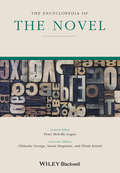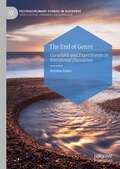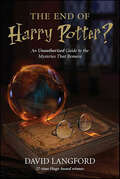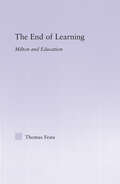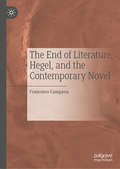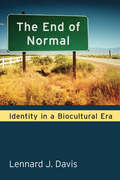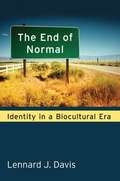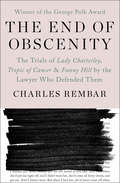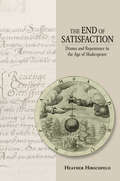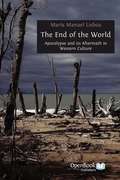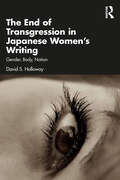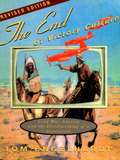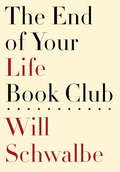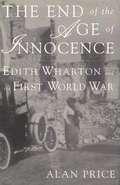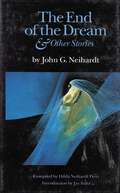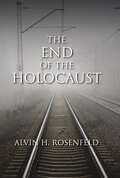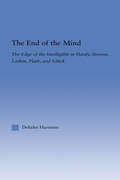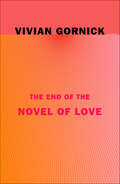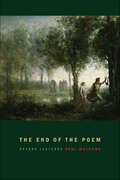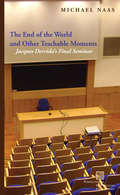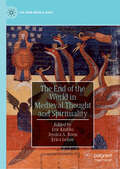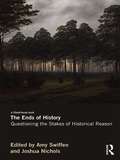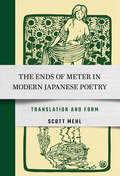- Table View
- List View
The Encyclopedia of the Novel (Wiley-Blackwell Encyclopedia of Literature)
by Susan Hegeman Efraín Kristal Olakunle George Peter Melville LoganNow available in a single volume paperback, this advanced reference resource for the novel and novel theory offers authoritative accounts of the history, terminology, and genre of the novel, in over 140 articles of 500-7,000 words. Entries explore the history and tradition of the novel in different areas of the world; formal elements of the novel (story, plot, character, narrator); technical aspects of the genre (such as realism, narrative structure and style); subgenres, including the bildungsroman and the graphic novel; theoretical problems, such as definitions of the novel; book history; and the novel's relationship to other arts and disciplines. The Encyclopedia is arranged in A-Z format and features entries from an international cast of over 140 scholars, overseen by an advisory board of 37 leading specialists in the field, making this the most authoritative reference resource available on the novel. This essential reference, now available in an easy-to-use, fully indexed single volume paperback, will be a vital addition to the libraries of literature students and scholars everywhere.
The End of Genre: Curations and Experiments in Intentional Discourses (Postdisciplinary Studies in Discourse)
by Brenton FaberThis book explores early new critical debates about intention, tracing how and why intention was dismissed across much humanities scholarship, and how it can be revisited and made relevant as a key formative, evaluative, and ethical concept. The author argues that the academic disinterest in intention occurred simultaneously as genre criticism and later the rhetorical interest in genre came into its own. Genre became a way to simultaneously elide and naturalize intention. The book elaborates on the pedagogical, ethical, and empirical consequences naturalizing intention through genre has had for rhetorical studies and it offers a new term, “curations” to identify discursive forms, actions, and intentions working simultaneously. Finally, he also examines the gap between the humanities and STEM fields and shows specific ways scientists and engineers have called for the humanities to become more invested in intention as both a critical and an operational concept. This book will be of interest to students and scholars of discourse studies and critical discourse analysis, rhetoric and professional communication, including those in fields such as medicine, engineering, STS and business studies.
The End of Harry Potter?: An Unauthorized Guide to the Mysteries That Remain
by David LangfordIn The End of Harry Potter?, David Langford—Potter fan and award-winning writer—examines the many mysteries that remained unsolved prior to publication of the final volume of J. K. Rowling's magical series.The publication of Harry Potter and the Deathly Hallows, the seventh and final Harry Potter novel, was one of the most eagerly anticipated events in the history of publishing. Even the smallest hints from the author about what may happen to Harry and his friends generated major news stories.Is Albus Dumbledore really dead?Whose side is Severus Snape really on?What are the remaining horcruxes, where He Who Shall Not Be Named has stashed his soul?Does Harry bear a part of the Dark Lord's soul in his scar, and is this why he understands Parseltongue?In this highly entertaining book, Langford uses his deep knowledge of the six published Harry Potter novels to explore these and other mysteries, and to present a selection of possible outcomes.While Harry Potter and the Deathly Hallows may lay these questions to rest, Potter fans will still find David Langford's book enchanting and thought-provoking, and a perfect way to refresh their memory of the first six books in this beloved series.At the Publisher's request, this title is being sold without Digital Rights Management Software (DRM) applied.
The End of Learning: Milton and Education (Studies in Major Literary Authors)
by Thomas FestaThis book shows that education constitutes the central metaphor of John Milton's political as well as his poetic writing. Demonstrating how Milton's theory of education emerged from his own practices as a reader and teacher, this book analyzes for the first time the relationship between Milton's own material habits as a reader and his theory of the power of books. Milton's instincts for pedagogy, and the habits of inculcation everywhere visible in his writings, take on a larger political function in his use of education as a trope for the transmission of intellectual history. The book therefore analyzes Paradise Lost in the complementary contexts of its outright educational claims and more subversive countervailing measures in order to show how Milton dramatizes "the end of learning," which is to say both its objective and its failure. The thesis emphasizes the argumentative resourcefulness of Milton's efforts to liberate readers from the tyrannical bonds of their political innocence, most immediately in the context of the failure of Cromwell's regime to establish lasting republican institutions. More philosophically, the book explores the ways in which Milton's works investigate the humane and intellectual yearning for justice in response to the problem of evil.
The End of Literature, Hegel, and the Contemporary Novel
by Francesco CampanaThis book explores the concept of the end of literature through the lens of Hegel's philosophy of art. In his version of Hegel's 'end of art' thesis, Arthur Danto claimed that contemporary art has abandoned its distinctive sensitive and emotive features to become increasingly reflective. Contemporary art has become a question of philosophical reflection on itself and on the world, thus producing an epochal change in art history. The core idea of this book is that this thesis applies quite well to all forms of art except one, namely literature: literature resists its 'end'.Unlike other arts, which have experienced significant fractures in the contemporary world, Campana proposes that literature has always known how to renew itself in order to retain its distinguishing features, so much so that in a way it has always come to terms with its own end. Analysing the distinct character of literature, this book proposes a new and original interpretation of the 'end of art' thesis, showing how it can be used as a key conceptual framework to understand the contemporary novel.
The End of Normal: Identity in a Biocultural Era
by Lennard DavisIn an era when human lives are increasingly measured and weighed in relation to the medical and scientific, notions of what is "normal" have changed drastically. While it is no longer useful to think of a person's particular race, gender, sexual orientation, or choice as "normal," the concept continues to haunt us in other ways. In The End of Normal, Lennard J. Davis explores changing perceptions of body and mind in social, cultural, and political life as the twenty-first century unfolds. The book's provocative essays mine the worlds of advertising, film, literature, and the visual arts as they consider issues of disability, depression, physician-assisted suicide, medical diagnosis, transgender, and other identities. Using contemporary discussions of biopower and biopolitics, Davis focuses on social and cultural production--particularly on issues around the different body and mind. The End of Normal seeks an analysis that works comfortably in the intersection between science, medicine, technology, and culture, and will appeal to those interested in cultural studies, bodily practices, disability, science and medical studies, feminist materialism, psychiatry, and psychology.
The End of Normal: Identity in a Biocultural Era
by Lennard J. DavisIn The End of Normal, Lennard J. Davis explores changing perceptions of body and mind in social, cultural, and political life as the twenty-first century unfolds. The book’s provocative essays mine the worlds of advertising, film, literature, and the visual arts as they consider issues of disability, depression, physician-assisted suicide, medical diagnosis, transgender, and other identities.
The End of Obscenity: The Trials of Lady Chatterley, Tropic of Cancer & Fanny Hill by the Lawyer Who Defended Them
by Charles RembarWinner of the George Polk Award: Charles Rembar's illuminating account of overturning America's obscenity laws and protecting literature from censorship Up until the 1960s, depending on your state of residence, your copy of Henry Miller's Tropic of Cancer might be seized by the US Postal Service before reaching your mailbox. Selling copies of Cleland's Fanny Hill in your bookstore was considered illegal. Lady Chatterley's Lover by D. H. Lawrence was, according to the American legal system, pornography with no redeeming social value. Today, these novels are celebrated for their literary and historic worth. The End of Obscenity is Charles Rembar's account of successfully arguing the merits of such great works of literature in front of the Supreme Court. As the lead attorney on the case, he--with the support of a few brave publishers--changed the way Americans read and honor books, especially the controversial ones. Filled with insight from lawyers, justices, and the authors themselves, The End of Obscenity is a lively tour de force. Racy testimony and hilarious asides make Rembar's memoir not only a page-turner but also an enlightening look at the American legal system.
The End of Satisfaction: Drama and Repentance in the Age of Shakespeare
by Heather HirschfeldIn The End of Satisfaction, Heather Hirschfeld recovers the historical specificity and the conceptual vigor of the term “satisfaction” during the sixteenth and early seventeenth centuries. Focusing on the term’s significance as an organizing principle of Christian repentance, she examines the ways in which Shakespeare and his contemporaries dramatized the consequences of its re- or de-valuation in the process of Reformation doctrinal change. The Protestant theology of repentance, Hirschfeld suggests, underwrote a variety of theatrical plots “to set things right” in a world shorn of the prospect of “making enough” (satisfacere).Hirschfeld’s semantic history traces today’s use of “satisfaction”—as an unexamined measure of inward gratification rather than a finely nuanced standard of relational exchange—to the pressures on legal, economic, and marital discourses wrought by the Protestant rejection of the Catholic sacrament of penance (contrition, confession, satisfaction) and represented imaginatively on the stage. In so doing, it offers fresh readings of the penitential economies of canonical plays including Dr. Faustus, The Revenger’s Tragedy, The Merchant of Venice, and Othello; considers the doctrinal and generic importance of lesser-known plays including Enough Is as Good as a Feast and Love’s Pilgrimage; and opens new avenues into the study of literature and repentance in early modern England.
The End of The World: Apocalypse And Its Aftermath In Western Culture
by Maria Manuel LisboaOur fear of the world ending, like our fear of the dark, is ancient, deep-seated and perennial. It crosses boundaries of space and time, recurs in all human communities and finds expression in every aspect of cultural production - from pre-historic cave paintings to high-tech computer games. This volume examines historical and imaginary scenarios of apocalypse, the depiction of its likely triggers, and imagined landscapes in the aftermath of global destruction. Its discussion moves effortlessly from classic novels including Aldous Huxley's Brave New World, George Orwell's Nineteen Eighty-Four and Margaret Atwood's Oryx and Crake, to blockbuster films such as Blade Runner, Armageddon and Invasion of the Body Snatchers. Lisboa also takes into account religious doctrine, scientific research and the visual arts to create a penetrating, multi-disciplinary study that provides profound insight into one of Western culture's most fascinating and enduring preoccupations.
The End of Transgression in Japanese Women’s Writing: Gender, Body, Nation
by David S. HollowayThis book argues for a new articulation of the ways in which transgression is theorized in contemporary literature by Japanese women.Exploring the rhetorical and discursive mechanics of literary “bad girls” from fiction produced during the millennial turn (1990–2010), the book contends that women writers today deploy truant, unruly, restless, and aggressive female protagonists not to challenge the status quo but rather to reaffirm it. While Japanese women’s fiction has long been invested in cultivating an uncomfortable politics of opposition through “unladylike” themes such as sex, sexuality, and violence, the book argues that today authors turn to such acts of defiance to quietly advocate for the primacy of Japanese social order. Showing how transgression has not only lost its political and disruptive valence in contemporary women’s fiction, this book further reveals how discourses of dissent can be retooled to promote a conservative worldview.A fascinating literary analysis which reads Japanese literature in relation to the receding value of rebellion today, this book will be of huge interest to students and scholars of Japanese literature, gender, and cultural studies.
The End of Victory Culture: Cold War America and the Disillusioning of a Generation
by Tom EngelhardtIn a substantial new afterword to his classic account of the collapse of American triumphalism in the wake of World War II, Tom Engelhardt carries that story into the twenty-first century. He explores how, in the aftermath of September 11, 2001, the younger George Bush headed for the Wild West (Osama bin Laden, "Wanted, Dead of Alive"); how his administration brought "victory culture" roaring back as part of its Global War on Terror and its rush to invade Saddam Husseins's Iraq; and how, from its "Mission Accomplished" moment on, its various stories of triumph crashed and burned in that land.
The End of Your Life Book Club
by Will Schwalbe"What are you reading?" That's the question Will Schwalbe asks his mother, Mary Anne, as they sit in the waiting room of the Memorial Sloan-Kettering Cancer Center. In 2007, Mary Anne returned from a humanitarian trip to Pakistan and Afghanistan suffering from what her doctors believed was a rare type of hepatitis. Months later she was diagnosed with a form of advanced pancreatic cancer, which is almost always fatal, often in six months or less. This is the inspiring true story of a son and his mother, who start a "book club" that brings them together as her life comes to a close. Over the next two years, Will and Mary Anne carry on conversations that are both wide-ranging and deeply personal, prompted by an eclectic array of books and a shared passion for reading. Their list jumps from classic to popular, from poetry to mysteries, from fantastic to spiritual. The issues they discuss include questions of faith and courage as well as everyday topics such as expressing gratitude and learning to listen. Throughout, they are constantly reminded of the power of books to comfort us, astonish us, teach us, and tell us what we need to do with our lives and in the world. Reading isn't the opposite of doing; it's the opposite of dying. Will and Mary Anne share their hopes and concerns with each other--and rediscover their lives--through their favorite books. When they read, they aren't a sick person and a well person, but a mother and a son taking a journey together. The result is a profoundly moving tale of loss that is also a joyful, and often humorous, celebration of life: Will's love letter to his mother, and theirs to the printed page. This eBook edition includes a Reading Group Guide.
The End of the Age of Innocence: Edith Wharton and the End of the First World War
by Alan PriceEvaluation of her work.
The End of the Age of Innocence: Edith Wharton and the First World War
by Alan PriceThis book provides an overview of Wharton's life during World War II and how the war affected her writing and world-view. This book includes extensive new information on Wharton - based upon her unpublished letters, archival materials, and the extensive research by the author.
The End of the Dream and Other Stories
by John G. NeihardtOriginally published at the beginning of the twentieth century, the short stories of John G. Neihardt deserve to be better known. Their flesh-and-blood Indians were practically unprecedented in an era when the fiends of dime novels and idealizations of Cooper were still the literary norm. Owing much to young Neihardt's intimate association with the Omahas at their reservation in eastern Nebraska, the stories were of an Indian cast that perplexed the critics. They were often overlooked as the years brought laurels to the author of A Cycle of the West and Black Elk Speaks. A closer look at them reveals that Neihardt was a disciplined artist from the very beginning.The nine stories in this volume appeared from 1901 to 1905 in the Overland Monthly; five were collected in The Lonesome Trail in 1907. All of them are informed by Neihardt's experience among Omaha Indians and shaped by the power of his imagination. Except for "A Prairie Borgia," which clearly touches on the notorious Chief Blackbird's relations with traders, all are set in the time before contact with white men. Love and hate, kindness and cruelty, hope and despair, generosity and envy, honesty and guile, spiritual impulse and sexual desire operate in this wholly Indian world. "The End of the Dream," 'The Triumph of Seha," and "The Smile of God" are patterned on vision quests issuing in profound irony. The social outcast who figured in Neihardt's Indian Tales and Others (1927, a Bison Book), appears again in adventures with a cosmic, and sometimes fantastic, dimension. These stories, as well as "When the Snows Drift," "The Beating of the War Drums," "The Fading of Shadow Flower," "The Singing of the Frogs," and "The Spirit of Crow Butte," have an inwardness reflected by vivid imagery. Their quality led Dr. Susan LaFlesche Picotte, the daughter of Joseph LaFlesche (Iron Eyes), last chief of the Omahas, to exclaim that Neihardt was the only writer in a long line extending from Cooper to Frederic Remington who possessed "a true understanding of Indian character."The stories were compiled by Neihardt's daughter, Hilda Neihardt Petri. In his introduction Jay Fultz discusses their cultural context and artistic integrity.
The End of the Holocaust
by Alvin H. RosenfeldIn this provocative work, Alvin H. Rosenfeld contends that the proliferation of books, films, television programs, museums, and public commemorations related to the Holocaust has, perversely, brought about a diminution of its meaning and a denigration of its memory. Investigating a wide range of events and cultural phenomena, such as Ronald Reagan's 1985 visit to the German cemetery at Bitburg, the distortions of Anne Frank's story, and the ways in which the Holocaust has been depicted by such artists and filmmakers as Judy Chicago and Steven Spielberg, Rosenfeld charts the cultural forces that have minimized the Holocaust in popular perceptions. He contrasts these with sobering representations by Holocaust witnesses such as Jean Améry, Primo Levi, Elie Wiesel, and Imre Kertész. The book concludes with a powerful warning about the possible consequences of "the end of the Holocaust" in public consciousness.
The End of the Mind: The Edge of the Intelligible in Hardy, Stevens, Larking, Plath, and Gluck (Literary Criticism and Cultural Theory)
by DeSales HarrisonFirst Published in 2005. Routledge is an imprint of Taylor & Francis, an informa company.
The End of the Novel of Love
by Vivian GornickA finalist for the National Book Critics Circle Award for Criticism that explores the meaning of love and marriage as literary themes in the twentieth century.In The End of the Novel of Love, an acclaimed and provocative collection of criticism, Gornick applies the same intelligence, honesty, and insight that define her memoirs to an analysis of love and marriage as literary themes in the twentieth century. She examines the work and lives of several authors she admires—including Grace Paley, Willa Cather, Jean Rhys, George Meredith, Jane Smiley, Richard Ford, and Andre Dubus—to ultimately posit that love, sexual fulfillment, and marriage are now exhausted as the metaphorical expressions of success and happiness.Spanning the depths of common experience and the expanse of twentieth century literature, Gornick crafts an argument that is as defined by discourse as it is by the power of her language, which is gracefully poised between objective knowledge and subjective experience. In these eleven essays, she comes to see that, for most writers, like most readers, it is the drama of our angry and frightened selves in the presence of love that is our modern preoccupation. The End of the Novel of Love is a strikingly original and thought-provoking collection from a canonical critic.“Reading her essays, one is reassured that the conversation between life and literature is mutually sustaining as well as mutually corrective.” —The New York Times Book Review“Small in bulk but large in implication. The book is a pleasure and a stimulus: persuasive, finely wrought, quivering with intelligence.” —George Scialabba, Boston Review“An exceptionally well-written, original, and thought-provoking set of essays.” —Kirkus Reviews
The End of the Poem: Oxford Lectures
by Paul MuldoonIn The End of the Poem, Paul Muldoon, "the most significant English-language poet born since the Second World War" (The Times Literary Supplement), presents engaging, rigorous, and insightful explorations of a diverse group of poems, from Yeats's "All Souls' Night" to Stevie Smith's "I Remember" to Fernando Pessoa's "Autopsychography." Here Muldoon reminds us that the word "poem" comes, via French, from the Latin and Greek: "a thing made or created." He asks: Can a poem ever be a freestanding, discrete structure, or must it always interface with the whole of its author's bibliography—and biography? Muldoon explores the boundlessness, the illimitability, created by influence, what Robert Frost meant when he insisted that "the way to read a poem in prose or verse is in the light of all the other poems ever written." And he writes of the boundaries or borders between writer and reader and the extent to which one determines the role of the other.At the end, Muldoon returns to the most fruitful, and fraught, aspect of the phrase "the end of the poem": the interpretation that centers on the "aim" or "function" of a poem, and the question of whether or not the end of the poem is the beginning of criticism. Irreverent, deeply learned, often funny, and always stimulating, The End of the Poem is a vigorous and accessible approach to looking at poetry anew.
The End of the World and Other Teachable Moments: Jacques Derrida's Final Seminar (Perspectives in Continental Philosophy)
by Michael NaasThe End of the World and Other Teachable Moments follows the remarkable itinerary of Jacques Derrida’s final seminar, “The Beast and the Sovereign” (2001–3), as the explicit themes of the seminar—namely, sovereignty and the question of the animal—come to be supplemented and interrupted by questions of death, mourning, survival, the archive, and, especially, the end of the world.The book begins with Derrida’s analyses, in the first year of the seminar, of the question of the animal in the context of his other published works on the same subject. It then follows Derrida through the second year of the seminar, presented in Paris from December 2002 to March 2003, as a very different tone begins to make itself heard, one that wavers between melancholy and an extraordinary lucidity with regard to the end. Focusing the entire year on just two works, Daniel Defoe’s Robinson Crusoe and Martin Heidegger’s seminar of 1929–30, “The Fundamental Concepts of Metaphysics,” the seminar comes to be dominated by questions of the end of the world and of an originary violence that at once gives rise to and effaces all things.The End of the World and Other Teachable Moments follows Derrida as he responds from week to week to these emerging questions, as well as to important events unfolding around him, both world events—the aftermath of 9/11, the American invasion of Iraq—and more personal ones, from the death of Maurice Blanchot to intimations of his own death less than two years away. All this, the book concludes, makes this final seminar an absolutely unique work in Derrida’s corpus, one that both speaks of death as the end of the world and itself now testifies to that end—just one, though hardly the least, of its many teachable moments.
The End of the World in Medieval Thought and Spirituality (The New Middle Ages)
by Jessica A. Boon Eric Knibbs Erica GelserThis essay collection studies the Apocalypse and the end of the world, as these themes occupied the minds of biblical scholars, theologians, and ordinary people in Antiquity, the Middle Ages, and Early Modernity. It opens with an innovative series of studies on “Gendering the Apocalypse,” devoted to the texts and contexts of the apocalyptic through the lens of gender. A second section of essays studies the more traditional problem of “Apocalyptic Theory and Exegesis,” with a focus on authors such as Augustine of Hippo and Joachim of Fiore. A final series of essays extends the thematic scope to “The Eschaton in Political, Liturgical, and Literary Contexts.” In these essays, scholars of history, theology, and literature create a dialogue that considers how fear of the end of the world, among the most pervasive emotions in human experience, underlies a great part of Western cultural production.
The Ends of History: Questioning the Stakes of Historical Reason (Laurier Studies In Political Philosophy Ser. #1)
by Amy Swiffen Joshua NicholsThe Ends of History? considers how, despite the fact that events in the past 20 years have called Francis Fukuyama’s infamous announcement of the end of history into question, the issue of the end of history is now a matter of renewed interest and debate. Two decades ago we were confronted by the end of the Soviet Union and collapse of the geo-political divisions that had defined much of the twentieth century. From this particular end, the ‘end of history’ was proclaimed. But is it still possible to argue that liberal democracy and free market capitalism are the final form of law and mode of production in human history? Recent events have called this thesis into question: from 9/11 and the War on Terror, to the current global economic collapse and looming ecological crises, it seems that history if far from over. And yet, oddly enough, the question of ‘the end’ has returned. For example, in the often predicted, but still uncertain, establishment of either a new international American Empire or a new era of International Law, and the global resurgence of religion as a dominant source of political identification. On the other hand, perhaps the ‘end’ is still yet to come, slowly accumulating, mustering at the periphery of the geo-political landscape and outside the productive sphere. Responses taking up these questions range from a return to Universalism, political theology, Messianism, and even the old specter of communism. This volume assesses these responses, exploring what is at stake in proclaiming ‘the end’ in the current historical moment. Is it a matter of reading the writing on the wall? Or is the proclamation itself a political act? Furthermore is there a desire for the ‘end’? In addressing these questions, the contributors to The Ends of History? confront the various ‘ends’ that we now live, and in so doing they open new lines of sight into the future.
The Ends of Meter in Modern Japanese Poetry: Translation and Form
by Scott MehlIn The Ends of Meter in Modern Japanese Poetry, Scott Mehl analyzes the complex response of Meiji-era Japanese poets and readers to the challenge introduced by European verse and the resulting crisis in Japanese poetry. Amidst fierce competition for literary prestige on the national and international stage, poets and critics at the time recognized that the character of Japanese poetic culture was undergoing a fundamental transformation, and the stakes were high: the future of modern Japanese verse. Mehl documents the creation of new Japanese poetic forms, tracing the first invention of Japanese free verse and its subsequent disappearance. He examines the impact of the acclaimed and reviled shintaishi, a new poetic form invented for translating European-language verse and eventually supplanted by the reintroduction of free verse as a Western import. The Ends of Meter in Modern Japanese Poetry draws on materials written in German, Spanish, English, and French, recreating the global poetry culture within which the most ambitious Meiji-era Japanese poets vied for position.
The Ends of the Body
by Suzanne Conklin Akbari Jill RossDrawing on Arabic, English, French, Irish, Latin and Spanish sources, the essays share a focus on the body's productive capacity - whether expressed through the flesh's materiality, or through its role in performing meaning.The collection is divided into four clusters. 'Foundations' traces the use of physical remnants of the body in the form of relics or memorial monuments that replicate the form of the body as foundational in communal structures; 'Performing the Body' focuses on the ways in which the individual body functions as the medium through which the social body is maintained; 'Bodily Rhetoric' explores the poetic linkage of body and meaning; and 'Material Bodies' engages with the processes of corporeal being, ranging from the energetic flow of humoural liquids to the decay of the flesh.Together, the essays provide new perspectives on the centrality of the medieval body and underscore the vitality of this rich field of study.
